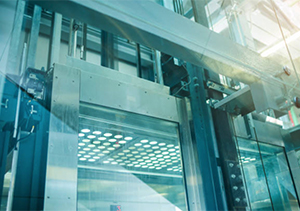Quiet startup…
Quicker floor-to-floor times…
Protection that extends motor life…
Hydraulic elevators more than 20 years old may be equipped with mechanical starters that are prone to failure. In addition to reliability and noise issues, mechanical starters can allow energy spikes that cause motor damage or even motor failure (leading to a major outage event). By replacing these mechanical starters with solid-state soft starters, you can eliminate or reduce each of these problems, and enhance the performance and operation of hydraulic elevators, starting right away.
Quieter, smoother startup.
Soft starters eliminate mechanical contacts in the starter unit, providing quiet startup with the advantage of having no moving parts. Soft starters provide a more controlled ramp-up of the motor, resulting in smoother elevator startup without physical jolts to the motor. Because soft starters regulate the in-rush current to the motor, they reduce the shock to electric motors at start-up. In addition to quieter startup of the elevator motor, this results in protection that can greatly extend the life of the motor.
Quicker floor-to-floor times.
Soft starters also eliminate startup delays associated with timers, resulting in a noticeable improvement in floor-to-floor travel times. Passengers may also notice a quieter startup, as the noise associated with mechanical starters is no longer present.
Protection that extends motor life.
In addition to providing smoother elevator startup, soft starter technology offers important protections for your elevator motor itself. Through this protection, soft starters help extend the life of the elevator motor, mitigating the risk of motor failure and the downtime of a major outage event.
The smooth operation of the solid-state soft starter eliminates the risk of high in-rush electric currents that can cause potential damage to the elevator motor at each startup. By eliminating this risk, soft starters provide continuous, reliable protection that can add years to the motor’s life. Soft starters also reduce voltage dips during ramp-up, providing additional protection against electric current variations that can damage the motor windings and pump.
In fact, replacing old mechanical starters with solid-state soft starters helps elevator owners eliminate a common potential cause of elevator failure: motor burnout. This is due to the fact that when mechanical starters seize up, the motor will continue to run until it burns out – resulting in a major service event that can lead to extended elevator downtime. Soft starters eliminate this potential cause of motor failure by eliminating mechanical contacts in the starter.
Conclusion.
Making the upgrade to a solid-state soft starter is recommended for nearly any hydraulic elevator placed in service before the year 2000. Not only will this upgrade provide improvements in elevator operation that passengers notice – such as quieter startup, quicker floor-to-floor travel, and reduced physical shock – it will provide enhanced electrical protection of the motor and pump, leading to potentially extended motor life and added peace of mind.


